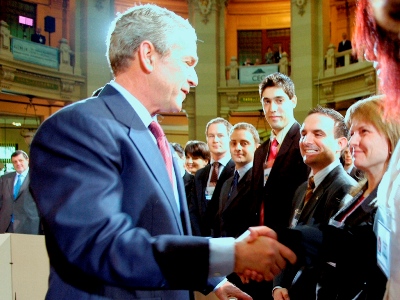As world leaders met this April for the largest NATO summit in Alliance history, future leaders from across the Euro-Atlantic region and Afghanistan convened in Bucharest to grapple with the major security issues facing the Atlantic Community today and to launch an innovative on-line community – the Young Atlanticist Network. The Young Atlanticist Summit, held in conjunction with the official NATO Summit, brought together over 120 students and young professionals representing NATO and Partnership for Peace countries, as well as top students from the University of Kabul. They had an extraordinary opportunity to meet directly with national and Alliance decision-makers and to build consensus on critical issues in the Alliance. Delegates at the Young Atlanticist Summit issued statements addressing the Alliance role in energy security , the controversy over the Macedonian name , and mechanisms for building closer relations between Alliance and Afghan publics.
The Young Atlanticists discussed current Alliance priorities and challenges with a wide range of leaders, including Secretary General Jaap de Hoop Scheffer, Supreme Allied Commander General John Craddock, Afghan President Hamid Karzai, Georgian President Mikheil Saakashvili, U.S. President George W. Bush, Dutch PM Jan Peter Balkenende, Albanian PM Sali Berisha, Estonian President Toomas Ilves, U.K. Foreign Secretary David Miliband, and U.S. First Lady Laura Bush. Romanian Prime Minister Calin Popescu Tariceanu and President Traian Basescu also met with the group, the latter at the official summit’s North Atlantic Council table.
Reaching out through the first ever videoconference link with the University of Kabul, the Young Atlanticists learned about the many challenges affecting the security of that country and heard Afghan perspectives on the type of assistance most needed by Kabul. At the end of the Young Atlanticist Summit, a joint declaration was issued calling for the creation of a network of Afghan youth that could be linked to the Youth Atlantic Treaty Association network in order to strengthen links between civil societies.
When the official NATO summit failed to invite FYR Macedonia to join the Alliance because of Greek objections to the name Republic of Macedonia, the Young Atlanticist delegates rallied to find a solution. During a day of intensive talks, Greek and Macedonian delegates stressed the common Euro-Atlantic perspective shared by their countries and announced their plans to initiate a combined working group of the Greek and Macedonian YATAs to promote joint activities, including further discussion of the name issue.
The Young Atlanticists also participated in a model NATO simulation, each acting as their national delegation as NATO struggled to define its policy toward energy security in the midst of a crisis. The lively debates brought together the different perspectives of 35 nations, but also led to a forward-looking communique that identified NATO’s role in key areas.
Driven by a dynamic website featuring live-blogging and videos by young journalists, the Young Atlanticist Summit laid the groundwork for the launch of a major new initiative – the Young Atlanticist Network. Designed to promote consensus and leadership, this network will provide a permanent on-line forum for Summit participants and other future leaders to exchange views, engage with world leaders, and stay in contact for years to come.
The Young Atlanticist Summit was organized under the leadership of the Atlantic Council of the United States and the Euro-Atlantic Council of Romania, in association with the Youth Atlantic Treaty Association and the Atlantic Treaty Association. It updates the tradition of the highly successful youth summits organized in Istanbul (2004) and Prague (2002), which each brought together 200 young leaders from NATO and PfP countries. The Young Atlanticist Summit was hosted by the Romanian Intelligence Service [logo and link] and was made possible through the generous support of its sponsors, including Boeing, which is a founding sponsor of the Young Atlanticist Network, and NATO’s Public Diplomacy Division, as well as others.
Image: bush2.jpg
